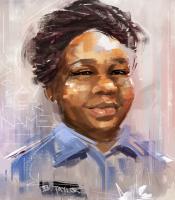 A lot of my pieces are social experiments to say, “What do you feel when you see this human life?” If your first reaction is to say, “They deserved to die because …,” that says a lot about who you are. I hope my art will speak to those people who are so quick to justify the taking of a human life, so that they think: “Wait. This person should still be on this earth. They deserved better.” Up until now, I’ve been creating art and advocating for Black lives from my perspective, of not wanting me to be pulled over and killed by the police.
A lot of my pieces are social experiments to say, “What do you feel when you see this human life?” If your first reaction is to say, “They deserved to die because …,” that says a lot about who you are. I hope my art will speak to those people who are so quick to justify the taking of a human life, so that they think: “Wait. This person should still be on this earth. They deserved better.” Up until now, I’ve been creating art and advocating for Black lives from my perspective, of not wanting me to be pulled over and killed by the police.
Mukanda
14.12.2020 | by Nikkolas Smith
 For 20 years, Fran Lebowitz has been dreaming of tourists disappearing from Times Square. “Now there are no tourists in Times Square,” she recently said, “but, of course, there’s no one in Times Square.” When the pandemic hit in March, Times Square went from a congested, and hellish, hub for tourists to an eerily empty dystopia. More recently, though, it has become a site of artistic expression, taken over by a free fall of protest art, colorful parades and performances. “It lacks the same history of worker organization spaces like Union Square, but with the spread of digital graphics and art during the Covid-19 pandemic and black-led uprisings, Times Square has made itself a unique site for protest in a city with more empty space, and an ongoing stream of creative mobilizations,” said Sarah J Seidman, a curator at the Museum of the City of New York.
For 20 years, Fran Lebowitz has been dreaming of tourists disappearing from Times Square. “Now there are no tourists in Times Square,” she recently said, “but, of course, there’s no one in Times Square.” When the pandemic hit in March, Times Square went from a congested, and hellish, hub for tourists to an eerily empty dystopia. More recently, though, it has become a site of artistic expression, taken over by a free fall of protest art, colorful parades and performances. “It lacks the same history of worker organization spaces like Union Square, but with the spread of digital graphics and art during the Covid-19 pandemic and black-led uprisings, Times Square has made itself a unique site for protest in a city with more empty space, and an ongoing stream of creative mobilizations,” said Sarah J Seidman, a curator at the Museum of the City of New York.
City
04.11.2020 | by Nadja Sayej
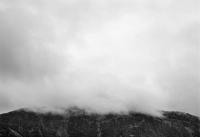 In 2010 Marta Lança set up the BUALA website, of which she is still the editor and the main driving force. To mark the 10th birthday of this unique platform dedicated to “exploring the synergies between art, theory, and activism in order to stimulate public debate about the lasting impact of racism and colonialism across Portuguese-speaking communities”, maat is hosting a special cycle of presentations, talks and screening entitled “and I am sparse in dense fluidity” – Gestures of Freedom”, curated by BUALA’s founder.
In 2010 Marta Lança set up the BUALA website, of which she is still the editor and the main driving force. To mark the 10th birthday of this unique platform dedicated to “exploring the synergies between art, theory, and activism in order to stimulate public debate about the lasting impact of racism and colonialism across Portuguese-speaking communities”, maat is hosting a special cycle of presentations, talks and screening entitled “and I am sparse in dense fluidity” – Gestures of Freedom”, curated by BUALA’s founder.
Face to face
30.10.2020 | by Nuno Ferreira de Carvalho and Marta Lança
 “If it hadn’t been for World War II, African countries wouldn’t have been able to liberate themselves from colonial empires”. This observation, made by Mamadou Diouf – a Senegal-born Pole, activist and legend of the Warsaw music scene, during a debate organized in June 2019 as part of the 30th Malta Festival in Poznań seems to be a provocation rather than an objective statement of facts. The average Pole is unable to imagine that this cruel conflict, which began in Poland, could bring anything positive for humanity. In a country so profoundly affected by this war, Diouf’s statement is surprising, almost shocking.
“If it hadn’t been for World War II, African countries wouldn’t have been able to liberate themselves from colonial empires”. This observation, made by Mamadou Diouf – a Senegal-born Pole, activist and legend of the Warsaw music scene, during a debate organized in June 2019 as part of the 30th Malta Festival in Poznań seems to be a provocation rather than an objective statement of facts. The average Pole is unable to imagine that this cruel conflict, which began in Poland, could bring anything positive for humanity. In a country so profoundly affected by this war, Diouf’s statement is surprising, almost shocking.
Afroscreen
20.10.2020 | by Katarzyna Cytlak
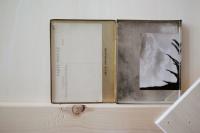 Through the territories of Brazilian northeast where he comes from and never cease to return, to the streets of São Paulo, London, Paris, Naples or a little village in Andaluzia, the artist is always moving. Not more as a traveler then exiled or immigrant, Ícaro Lira does not celebrates nomadism, but is interested in transfigurations – political, economical
and social, but also on intimate ones – brought by these circulations. Starting from his trips, which are above all meetings, he brings back objects: wood pieces, stones, pictures, trash, administrative documents, press articles, but also audio interviews and personal notes. So many traces with unique stories that, juxtaposed and on a set, became a weave of fragile meaning and open to interpretation.
Through the territories of Brazilian northeast where he comes from and never cease to return, to the streets of São Paulo, London, Paris, Naples or a little village in Andaluzia, the artist is always moving. Not more as a traveler then exiled or immigrant, Ícaro Lira does not celebrates nomadism, but is interested in transfigurations – political, economical
and social, but also on intimate ones – brought by these circulations. Starting from his trips, which are above all meetings, he brings back objects: wood pieces, stones, pictures, trash, administrative documents, press articles, but also audio interviews and personal notes. So many traces with unique stories that, juxtaposed and on a set, became a weave of fragile meaning and open to interpretation.
I'll visit
04.02.2020 | by Elena Lespes Muñoz
 Through the territories of Brazilian northeast where he comes from and never cease to return, to the streets of São Paulo, London, Paris, Naples or a little village in Andaluzia, the artist is always moving. Not more as a traveler then exiled or immigrant, Ícaro Lira does not celebrates nomadism, but is interested in transfigurations – political, economical
and social, but also on intimate ones – brought by these circulations. Starting from his trips, which are above all meetings, he brings back objects: wood pieces, stones, pictures, trash, administrative documents, press articles, but also audio interviews and personal notes. So many traces with unique stories that, juxtaposed and on a set, became a weave of fragile meaning and open to interpretation.
Through the territories of Brazilian northeast where he comes from and never cease to return, to the streets of São Paulo, London, Paris, Naples or a little village in Andaluzia, the artist is always moving. Not more as a traveler then exiled or immigrant, Ícaro Lira does not celebrates nomadism, but is interested in transfigurations – political, economical
and social, but also on intimate ones – brought by these circulations. Starting from his trips, which are above all meetings, he brings back objects: wood pieces, stones, pictures, trash, administrative documents, press articles, but also audio interviews and personal notes. So many traces with unique stories that, juxtaposed and on a set, became a weave of fragile meaning and open to interpretation.
I'll visit
04.02.2020 | by Elena Lespes Muñoz
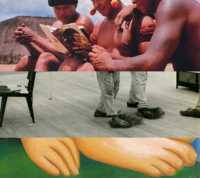 Art has always been able to gather critical tools of action from different contexts of knowledge in order to intervene in institutions, politics, and social problems. This makes it a privileged place to find new strategies for empistemodiversity. At the same time, art has always maintained a strict border between itself and popular culture, to ensure that art is on the same level as the Western sciences. What if this border disappeared? How do we construct a new language that uses popular knowledge not as a theme for contemporary art, but as a spark for creating new regimes of representation and new structures of thought? How can contemporary art contribute to the learning of epistemodiversity?
Art has always been able to gather critical tools of action from different contexts of knowledge in order to intervene in institutions, politics, and social problems. This makes it a privileged place to find new strategies for empistemodiversity. At the same time, art has always maintained a strict border between itself and popular culture, to ensure that art is on the same level as the Western sciences. What if this border disappeared? How do we construct a new language that uses popular knowledge not as a theme for contemporary art, but as a spark for creating new regimes of representation and new structures of thought? How can contemporary art contribute to the learning of epistemodiversity?
To read
10.10.2016 | by María Iñigo Clavo
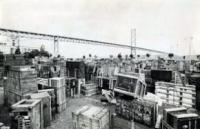 Europe is said to be currently facing the biggest refugee crisis since the Second World War. In the media, images of people escaping from their home countries devastated by war and misery and arriving to Europe are recurrent. As these pictures spread and instigate different reactions – some of them highly racist and xenophobic – another picture came to my mind: a picture of Lisbon in 1975 by Alfredo Cunha, shortly after the arrival of 6000 people from the Portuguese ex-colonies of Angola, Mozambique, Guinea-Bissau, São Tomé and Príncipe and Cape Verde.
in"Decolonizing Museums", L'Internacionale.
Europe is said to be currently facing the biggest refugee crisis since the Second World War. In the media, images of people escaping from their home countries devastated by war and misery and arriving to Europe are recurrent. As these pictures spread and instigate different reactions – some of them highly racist and xenophobic – another picture came to my mind: a picture of Lisbon in 1975 by Alfredo Cunha, shortly after the arrival of 6000 people from the Portuguese ex-colonies of Angola, Mozambique, Guinea-Bissau, São Tomé and Príncipe and Cape Verde.
in"Decolonizing Museums", L'Internacionale.
City
14.03.2016 | by Ana Bigotte Vieira
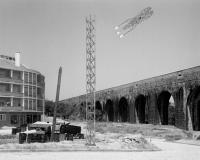 The text focuses on three operations – OPENING, REMOVAL and RESTITUTION - having Ana Hatherly’s work "As Ruas de Lisboa", Isabel Brison and Nuno Rodrigues de Sousa’s "O Monumento da Rotunda das Águas Livres", and Ana Bigotte Vieira’s "No Aleph – Notes about a research on Calouste Gulbenkian Foundation ACARTE Service (1984-1989)" as main sources. It is important to note that this text is being written in 2015, at a time when the brutal presence of a succession of absences in Portuguese recent history is felt more than ever. In fact, the current austerity policies point to the removal of a series of I would call ‘openings’ directly related to the Revolution on 25 April 1974 that overthrew António de Oliveira Salazar and Marcelo Caetano’s forty-eight year dictatorship and ended thirteen years of colonial wars. in"Decolonizing Museums", L'Internacionale
The text focuses on three operations – OPENING, REMOVAL and RESTITUTION - having Ana Hatherly’s work "As Ruas de Lisboa", Isabel Brison and Nuno Rodrigues de Sousa’s "O Monumento da Rotunda das Águas Livres", and Ana Bigotte Vieira’s "No Aleph – Notes about a research on Calouste Gulbenkian Foundation ACARTE Service (1984-1989)" as main sources. It is important to note that this text is being written in 2015, at a time when the brutal presence of a succession of absences in Portuguese recent history is felt more than ever. In fact, the current austerity policies point to the removal of a series of I would call ‘openings’ directly related to the Revolution on 25 April 1974 that overthrew António de Oliveira Salazar and Marcelo Caetano’s forty-eight year dictatorship and ended thirteen years of colonial wars. in"Decolonizing Museums", L'Internacionale
City
08.03.2016 | by Ana Bigotte Vieira
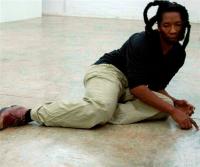 "I think there are so many misconceptions about African cultures. Besides, I use the ideas of used objects for rituals, but the material is different. Sometimes I abstract additionally the movements of such rituals. Anyway, I feel the need to alienate ritual elements; they mainly serve as an inspiration for me".
"I think there are so many misconceptions about African cultures. Besides, I use the ideas of used objects for rituals, but the material is different. Sometimes I abstract additionally the movements of such rituals. Anyway, I feel the need to alienate ritual elements; they mainly serve as an inspiration for me".
Stages
11.10.2011 | by Grit Köppen
 A lot of my pieces are social experiments to say, “What do you feel when you see this human life?” If your first reaction is to say, “They deserved to die because …,” that says a lot about who you are. I hope my art will speak to those people who are so quick to justify the taking of a human life, so that they think: “Wait. This person should still be on this earth. They deserved better.” Up until now, I’ve been creating art and advocating for Black lives from my perspective, of not wanting me to be pulled over and killed by the police.
A lot of my pieces are social experiments to say, “What do you feel when you see this human life?” If your first reaction is to say, “They deserved to die because …,” that says a lot about who you are. I hope my art will speak to those people who are so quick to justify the taking of a human life, so that they think: “Wait. This person should still be on this earth. They deserved better.” Up until now, I’ve been creating art and advocating for Black lives from my perspective, of not wanting me to be pulled over and killed by the police.  For 20 years, Fran Lebowitz has been dreaming of tourists disappearing from Times Square. “Now there are no tourists in Times Square,” she recently said, “but, of course, there’s no one in Times Square.” When the pandemic hit in March, Times Square went from a congested, and hellish, hub for tourists to an eerily empty dystopia. More recently, though, it has become a site of artistic expression, taken over by a free fall of protest art, colorful parades and performances. “It lacks the same history of worker organization spaces like Union Square, but with the spread of digital graphics and art during the Covid-19 pandemic and black-led uprisings, Times Square has made itself a unique site for protest in a city with more empty space, and an ongoing stream of creative mobilizations,” said Sarah J Seidman, a curator at the Museum of the City of New York.
For 20 years, Fran Lebowitz has been dreaming of tourists disappearing from Times Square. “Now there are no tourists in Times Square,” she recently said, “but, of course, there’s no one in Times Square.” When the pandemic hit in March, Times Square went from a congested, and hellish, hub for tourists to an eerily empty dystopia. More recently, though, it has become a site of artistic expression, taken over by a free fall of protest art, colorful parades and performances. “It lacks the same history of worker organization spaces like Union Square, but with the spread of digital graphics and art during the Covid-19 pandemic and black-led uprisings, Times Square has made itself a unique site for protest in a city with more empty space, and an ongoing stream of creative mobilizations,” said Sarah J Seidman, a curator at the Museum of the City of New York.  In 2010 Marta Lança set up the BUALA website, of which she is still the editor and the main driving force. To mark the 10th birthday of this unique platform dedicated to “exploring the synergies between art, theory, and activism in order to stimulate public debate about the lasting impact of racism and colonialism across Portuguese-speaking communities”, maat is hosting a special cycle of presentations, talks and screening entitled “and I am sparse in dense fluidity” – Gestures of Freedom”, curated by BUALA’s founder.
In 2010 Marta Lança set up the BUALA website, of which she is still the editor and the main driving force. To mark the 10th birthday of this unique platform dedicated to “exploring the synergies between art, theory, and activism in order to stimulate public debate about the lasting impact of racism and colonialism across Portuguese-speaking communities”, maat is hosting a special cycle of presentations, talks and screening entitled “and I am sparse in dense fluidity” – Gestures of Freedom”, curated by BUALA’s founder.  “If it hadn’t been for World War II, African countries wouldn’t have been able to liberate themselves from colonial empires”. This observation, made by Mamadou Diouf – a Senegal-born Pole, activist and legend of the Warsaw music scene, during a debate organized in June 2019 as part of the 30th Malta Festival in Poznań seems to be a provocation rather than an objective statement of facts. The average Pole is unable to imagine that this cruel conflict, which began in Poland, could bring anything positive for humanity. In a country so profoundly affected by this war, Diouf’s statement is surprising, almost shocking.
“If it hadn’t been for World War II, African countries wouldn’t have been able to liberate themselves from colonial empires”. This observation, made by Mamadou Diouf – a Senegal-born Pole, activist and legend of the Warsaw music scene, during a debate organized in June 2019 as part of the 30th Malta Festival in Poznań seems to be a provocation rather than an objective statement of facts. The average Pole is unable to imagine that this cruel conflict, which began in Poland, could bring anything positive for humanity. In a country so profoundly affected by this war, Diouf’s statement is surprising, almost shocking.  Through the territories of Brazilian northeast where he comes from and never cease to return, to the streets of São Paulo, London, Paris, Naples or a little village in Andaluzia, the artist is always moving. Not more as a traveler then exiled or immigrant, Ícaro Lira does not celebrates nomadism, but is interested in transfigurations – political, economical
and social, but also on intimate ones – brought by these circulations. Starting from his trips, which are above all meetings, he brings back objects: wood pieces, stones, pictures, trash, administrative documents, press articles, but also audio interviews and personal notes. So many traces with unique stories that, juxtaposed and on a set, became a weave of fragile meaning and open to interpretation.
Through the territories of Brazilian northeast where he comes from and never cease to return, to the streets of São Paulo, London, Paris, Naples or a little village in Andaluzia, the artist is always moving. Not more as a traveler then exiled or immigrant, Ícaro Lira does not celebrates nomadism, but is interested in transfigurations – political, economical
and social, but also on intimate ones – brought by these circulations. Starting from his trips, which are above all meetings, he brings back objects: wood pieces, stones, pictures, trash, administrative documents, press articles, but also audio interviews and personal notes. So many traces with unique stories that, juxtaposed and on a set, became a weave of fragile meaning and open to interpretation.  Art has always been able to gather critical tools of action from different contexts of knowledge in order to intervene in institutions, politics, and social problems. This makes it a privileged place to find new strategies for empistemodiversity. At the same time, art has always maintained a strict border between itself and popular culture, to ensure that art is on the same level as the Western sciences. What if this border disappeared? How do we construct a new language that uses popular knowledge not as a theme for contemporary art, but as a spark for creating new regimes of representation and new structures of thought? How can contemporary art contribute to the learning of epistemodiversity?
Art has always been able to gather critical tools of action from different contexts of knowledge in order to intervene in institutions, politics, and social problems. This makes it a privileged place to find new strategies for empistemodiversity. At the same time, art has always maintained a strict border between itself and popular culture, to ensure that art is on the same level as the Western sciences. What if this border disappeared? How do we construct a new language that uses popular knowledge not as a theme for contemporary art, but as a spark for creating new regimes of representation and new structures of thought? How can contemporary art contribute to the learning of epistemodiversity?  Europe is said to be currently facing the biggest refugee crisis since the Second World War. In the media, images of people escaping from their home countries devastated by war and misery and arriving to Europe are recurrent. As these pictures spread and instigate different reactions – some of them highly racist and xenophobic – another picture came to my mind: a picture of Lisbon in 1975 by Alfredo Cunha, shortly after the arrival of 6000 people from the Portuguese ex-colonies of Angola, Mozambique, Guinea-Bissau, São Tomé and Príncipe and Cape Verde.
in"Decolonizing Museums", L'Internacionale.
Europe is said to be currently facing the biggest refugee crisis since the Second World War. In the media, images of people escaping from their home countries devastated by war and misery and arriving to Europe are recurrent. As these pictures spread and instigate different reactions – some of them highly racist and xenophobic – another picture came to my mind: a picture of Lisbon in 1975 by Alfredo Cunha, shortly after the arrival of 6000 people from the Portuguese ex-colonies of Angola, Mozambique, Guinea-Bissau, São Tomé and Príncipe and Cape Verde.
in"Decolonizing Museums", L'Internacionale.  The text focuses on three operations – OPENING, REMOVAL and RESTITUTION - having Ana Hatherly’s work "As Ruas de Lisboa", Isabel Brison and Nuno Rodrigues de Sousa’s "O Monumento da Rotunda das Águas Livres", and Ana Bigotte Vieira’s "No Aleph – Notes about a research on Calouste Gulbenkian Foundation ACARTE Service (1984-1989)" as main sources. It is important to note that this text is being written in 2015, at a time when the brutal presence of a succession of absences in Portuguese recent history is felt more than ever. In fact, the current austerity policies point to the removal of a series of I would call ‘openings’ directly related to the Revolution on 25 April 1974 that overthrew António de Oliveira Salazar and Marcelo Caetano’s forty-eight year dictatorship and ended thirteen years of colonial wars. in"Decolonizing Museums", L'Internacionale
The text focuses on three operations – OPENING, REMOVAL and RESTITUTION - having Ana Hatherly’s work "As Ruas de Lisboa", Isabel Brison and Nuno Rodrigues de Sousa’s "O Monumento da Rotunda das Águas Livres", and Ana Bigotte Vieira’s "No Aleph – Notes about a research on Calouste Gulbenkian Foundation ACARTE Service (1984-1989)" as main sources. It is important to note that this text is being written in 2015, at a time when the brutal presence of a succession of absences in Portuguese recent history is felt more than ever. In fact, the current austerity policies point to the removal of a series of I would call ‘openings’ directly related to the Revolution on 25 April 1974 that overthrew António de Oliveira Salazar and Marcelo Caetano’s forty-eight year dictatorship and ended thirteen years of colonial wars. in"Decolonizing Museums", L'Internacionale  "I think there are so many misconceptions about African cultures. Besides, I use the ideas of used objects for rituals, but the material is different. Sometimes I abstract additionally the movements of such rituals. Anyway, I feel the need to alienate ritual elements; they mainly serve as an inspiration for me".
"I think there are so many misconceptions about African cultures. Besides, I use the ideas of used objects for rituals, but the material is different. Sometimes I abstract additionally the movements of such rituals. Anyway, I feel the need to alienate ritual elements; they mainly serve as an inspiration for me". 